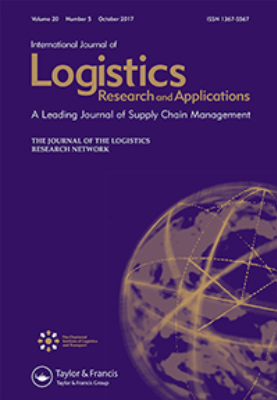重大传染病流行下应急物资动态供应链网络的鲁棒优化
IF 4.5
3区 管理学
Q1 MANAGEMENT
International Journal of Logistics Research and Applications
Pub Date : 2023-10-19
DOI:10.1080/13675567.2023.2269101
引用次数: 0
摘要
摘要新冠肺炎疫情给物流供应链管理带来了严峻挑战。本研究探讨如何向因传染病传播而受到检疫控制的人口提供生活物资。首先,我们提出了一个改进的SEIR模型来预测人员和材料需求的数量。考虑到传染病的动态演化和其他特征,以及由此产生的需求不确定性,以总成本最小为目标,建立了多周期动态应急物资供应链网络的鲁棒优化模型。然后,我们将其转化为一个可解的鲁棒对应模型,提出一个动态调整策略,并使用滚动地平线方法来处理它,以获得动态位置和材料分配决策。最后,以2022年上海疫情为例,验证了模型和方法的可行性和有效性。关键词:重大传染病流行修正SEIR模型应急物资供应链网络鲁棒优化不确定预算调整滚动地平线法数据可用性声明本研究的数据可应通讯作者要求提供。披露声明作者未报告潜在的利益冲突。伦理批准:本文不包含任何作者进行的人类或动物研究。项目资助:国家社会科学基金重点项目[批准号:20AJY016]。本文章由计算机程序翻译,如有差异,请以英文原文为准。
Robust optimization for a dynamic emergency materials supply chain network under major infectious disease epidemics
ABSTRACTThe COVID-19 outbreak has posed serious challenges to logistics and supply chain management. This study examines how living materials can be provided to a population under quarantine control due to the spread of infectious diseases. First, we present a modified SEIR model for predicting the number of people and materials demanded. Considering the dynamic evolution and other characteristics of infectious diseases, and the resulting demand uncertainty, we develop a robust optimization model for a multi-period dynamic emergency materials supply chain network with the objective of minimising total cost. We then transform it into a solvable robust counterpart model, propose a dynamic adjustment strategy, and cope with it using the Rolling Horizon approach to obtain dynamic location and materials distribution decisions. Finally, we conduct a case study of the Shanghai epidemic in 2022 to verify the feasibility and effectiveness of our model and method.KEYWORDS: Major infectious disease epidemicsmodified SEIR modelemergency materials supply chain networkrobust optimizationuncertain budget adjustmentrolling horizon approach Data availability statementThe data of this study are available upon request from the corresponding author.Disclosure statementNo potential conflict of interest was reported by the author(s).Ethics approvalThis article does not contain any studies with human participants or animals performed by any of the authors.Additional informationFundingThis work was supported by Key program of The National Social Science Fund of China [grant number 20AJY016].
求助全文
通过发布文献求助,成功后即可免费获取论文全文。
去求助
来源期刊
CiteScore
13.70
自引率
9.10%
发文量
71
期刊介绍:
International Journal of Logistics: Research & Applications publishes original and challenging work that has a clear applicability to the business world. As a result the journal concentrates on papers of an academic journal standard but aimed at the practitioner as much as the academic. High quality contributions are therefore welcomed from both academics and professionals working in the field of logistics and supply chain management. Papers should further our understanding of logistics and supply chain management and make a significant original contribution to knowledge. In this context the term "logistics" is taken in its broadest context as "the management of processes, flow of materials and associated information along the entire supply chain.

 求助内容:
求助内容: 应助结果提醒方式:
应助结果提醒方式:


